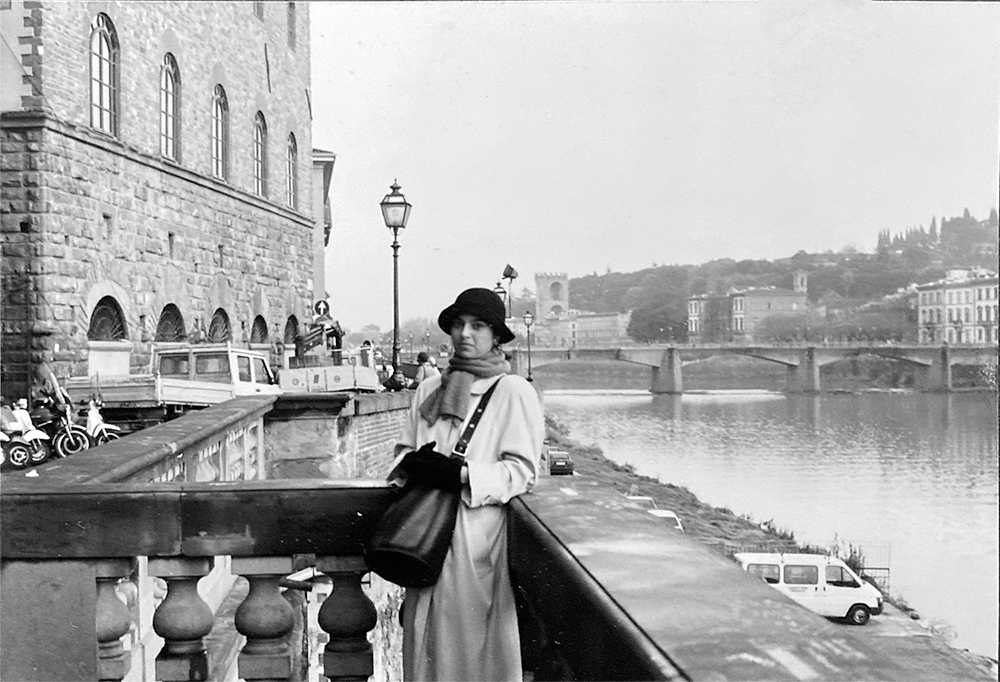Issue 247, Spring 2024

In Florence, on her first trip to Italy, 1994. All photographs courtesy of Jhumpa Lahiri.
My first conversations with Jhumpa Lahiri took place in Rome this past July, in her apartment near the Janiculum, above Trastevere. It was an extremely hot summer—one of our meetings was on the hottest day in Rome’s history, 110 degrees—and we sat with a large fan whirring in the living room, which, as in a scene from Henry James, looks out on the rolling hills over the suburra, until it was safe to step out to the terrace in the late afternoon. Among the bric-a-brac around the apartment were bits of vintage Sicilian-orange packaging, a plaque featuring the logo of the Italian Communist Party, and, framed in a glass case, a jersey signed by the soccer player Daniele De Rossi.
Lahiri was born in London in 1 967 to Bengali parents from Kolkata, and raised in a small town in Rhode Island. In 2012, she moved to Rome with her husband, the journalist and editor Alberto Vourvoulias-Bush, and their children, Octavio and Noor. She has spent the better part of the past decade shuttling between Italy and the U.S., where she’s held teaching posts at Princeton, from 2015 until 2022, and, since this past fall, at Barnard College, her alma mater, where she also directs the creative writing program. When we met again in October, it was at her brownstone in Fort Greene, Brooklyn, a four-story building bookended by a large kitchen and living space on the parlor floor and Lahiri’s top-floor study. She and Vourvoulias-Bush hadn’t lived in the house for a year or two, and while we spoke on the sofas, he was getting the place back in shape. Some of their furniture was still in storage, and several art pieces, abstract photo collages and large stretched canvases, lay against a white marble mantelpiece, waiting to be rehung. The walls were painted deep purple.
We spoke Italian in both cities, at her request. She began learning the language in earnest in her thirties, but her manner of speaking is spontaneous and unpretentious, with almost no trace of formality. (In my presence, she and Vourvoulias-Bush addressed each other in Italian.) She used English words only occasionally, as when quoting someone, often a figure from American publishing, a world with which she has a vexed relationship. Lahiri was thirty-two when she won the Pulitzer Prize for Fiction for her debut collection, Interpreter of Maladies (1999), and she remains the youngest writer to have received the award. The stories in that book, and the ones that followed in Unaccustomed Earth (2008), demonstrated an almost painful lightness of touch, an ability to make characters traverse years and emotional states in the span of just a few sentences, and a rare attention to the seismic power of even the smallest shift in a dynamic between two lovers or relatives. She was also celebrated for what many took as her central subject matter, the experience of Indian immigrants in the United States. Her debut novel, The Namesake (2003), was a critical and commercial hit, with a film adaptation three years after it was published; The Lowland (2013), which Lahiri described to me as her most ambitious and personally important book in English, takes a more digressive, fragmentary approach to what might be called the family saga, and is her last work of fiction written in English to date.
“I get the feeling people think that, because I write in Italian, I’m not writing at all anymore,” Lahiri told me. But since turning to Italian, not only has she been especially prolific, publishing six books in nine years, but she’s found new and varied forms in which to write, including the diaristic newspaper columns compiled in In Other Words (2015, translation 2016), about learning the language and beginning to write in it; the vignettes that structure Whereabouts (2018, translation 2021), a short novel following the life of a middle-aged university professor (“The title doesn’t work in English,” Lahiri says); and the very spare, drifting tales in Roman Stories (2022, translation 2023), about encounters between foreigners of various kinds in the city she calls home. Lahiri translated Whereabouts and most of the Roman Stories into English herself; her translations of Domenico Starnone’s novels Ties, Trust, and Trick, the latter a finalist for a National Book Award for Translated Literature, have brought new attention to his work in the U.S. With the classicist Yelena Baraz, she’s now working on a new translation of Ovid’s Metamorphoses for the Modern Library.
Speaking to Lahiri, one gets the sense that her restlessness, in life and in writing, is almost an ethic, a deliberate struggle against being pigeonholed. The last time we met, in her office at Barnard, I remembered that a green suitcase had been parked in the middle of her living room in Rome—she’d apologized then for how chaotic her life was. She pointed behind me in the office, and there it was again.
INTERVIEWER
I can’t help but notice the way you gesticulate when you talk ... Do you do that when you’re speaking in English, too?
JHUMPA LAHIRI
No, that’s the Italian part of me. If we were speaking English right now, I’d be more tense, more defensive.
INTERVIEWER
Why the difference?
LAHIRI
It’s almost impossible to explain—but in Italian, I can be the Jhumpa who goes to buy a sandwich from the Calabrian couple at the market by the Porta Portese, who goes to the pool in Trastevere, and when I say hi to the person swimming laps in the lane next to mine they won’t have the faintest idea of my other life. Those are the moments I feel most alive and at ease. Italy’s great gift to me is the voice that tells me that I don’t have to follow the rules, that I can be who I want and write what I want on my own terms. It’s only when I’m writing in Italian that I manage to turn off all those other, judgmental voices, except perhaps my own.

With a childhood friend in Kingston, Rhode Island.
INTERVIEWER
Which voices are we talking about exactly?
LAHIRI
In my life in English, so to speak, there’s a sense that if I don’t hit a certain benchmark, I’ve failed. That’s the judgment I’ve felt from American culture from the start—the expectation to assimilate, and then, when I became a writer, to “represent” the Indian American experience, the immigrant experience. Then there’s the eternal, original judgment—of my mother, my parents, their immigrant community, their many friends with advanced degrees. Theirs was a language of comparison and competition, everyone striving to establish themselves and get ahead. And there’s the overhanging judgment, of the world my parents left behind in Kolkata. All of which I internalized.
INTERVIEWER
It’s interesting—in your books in English, the family is a totalizing force, but you’ve put solitary women at the center of your Italian books.
LAHIRI
Thank you, Dr. Pacifico—maybe that’s because it’s only in Italian that I feel I’m at the center of myself.
INTERVIEWER
Right, end of session! That’ll be three hundred dollars.
Tell me, was there a moment when you first felt happy with your voice?
LAHIRI
No. The goal isn’t to be happy with my voice. What I want is simply to have one.
INTERVIEWER
So you didn’t feel, when you were starting out, that you’d hit on something?
LAHIRI
When I was working on the stories in Interpreter of Maladies, I wanted to write in a way that was almost without personality—to create a story that was completely neutral, as unobtrusive as possible. It was as though I didn’t want anyone to hear the key turning as I opened the door.



